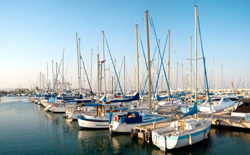 Has the advent of spring inspired you to browse the bobshop boating section? You are not alone. Many people dream of owning a boat. South Africa with its more than 2,500 kilometres long coastline, several navigable rivers and many artificial lakes, provides an ideal backdrop for such dreams.
Has the advent of spring inspired you to browse the bobshop boating section? You are not alone. Many people dream of owning a boat. South Africa with its more than 2,500 kilometres long coastline, several navigable rivers and many artificial lakes, provides an ideal backdrop for such dreams.
Alas, the dreams component is the most often cited culprit when it comes to analysing the mistakes people make when buying a boat. Buying a boat is a much more complex undertaking than buying a car. It is often more complex than buying a house, because it is an emotional issue, fraught with fantasies.
You are allowed to be swayed by your dreams if you belong to one of these two categories of perspective boat buyers: (1) people who can afford only a paddle watercraft that always remains within swimming distance from the terra firma and (2) people who are rich enough to buy a brand-new ship.
For everybody else – that is, for people looking for a decent second-hand vessel – it is imperative to hold on to at least a vestige of reality when making a purchasing decision. In that name, if you are lucky enough to have a wife, have her by your side for the purposes of a sanity check.
Experts say that long and careful research prior to any money changing hands is an absolute must.
Big or Small
You first need to settle on the type of boat that suits both your dreams and your means. It goes without saying that everybody wants a big boat. However, the sad truth is that a majority of prospective boat owners are famous for having champagne taste and beer budget: they want a bigger boat than they can afford.
Those that have learned from their own mistakes say that the golden rule when buying a boat is: buy quality, not quantity. In other words, if your choice is between a smaller four year-old model and a big 10 or 15 year-old model, go for the former.
Console yourself with the following reasoning: a small new model is easier to handle; it will cost you less on maintenance; and it will be easier to re-sell once you are financially ready to tackle buying a fancier vessel.
What to Look for
There are scores of things to consider when choosing which boat to buy. The rule of the thumb is: if the boat looks neglected, give it a pass. A fresh lick of paint will not fix what probably ails it.
Once you settle on a couple of boats, have a professional surveyor inspect them so that you do not end up with hidden damage in the hull or with a rusty engine. Remember to take your intended on a trial run. An on-water test-drive prior to purchase is a necessity.
When it comes to final negotiations, be sure to ask if the basic accessories (anchors, life jackets, ropes, lights, fenders) are part of the deal. Even for a smallish boat that can add up to several thousand Rands' worth of boating equipment and accessories.
If the vessel you settled on is fairly expensive, remember to use a reputable broker to seal the deal, just like you would when buying a house.
Renaming a Boat
Sailors are as superstitious as actors. One of the biggest superstitions is linked to renaming a boat. Normally, that is a taboo. But since even the most superstitious seafarers know that you cannot be expected to sail around in a boat displaying the previous owner's third wife's name (your own wife will not allow it), they have worked out a complicated ritual on how to rename a boat without provoking the wrath of gods.
The boat first needs to be de-named, preferably while hauled out. All references to the old name have to be removed, including mentions in the log books and on life rings. If you miss even one, you risk confusing your boat, and a confused boat is something you really do not want to deal with on open sea.
Then name your boat. Paint her new name, enter it into a new log, apply it to the life rings, etc. When the boat is back in the water, tell her the new name in a ceremony that includes an offering to the gods of the sea in the form of wine or champagne.
Some seafarers say that the above steps are enough to appease the gods. Others claim that the first time out with the new name the boat must be allowed to sail backwards. This represents "backing over" the old name.
Painstaking, yes – but so much more satisfying than filling in the official boat ownership forms, says one boat owner.